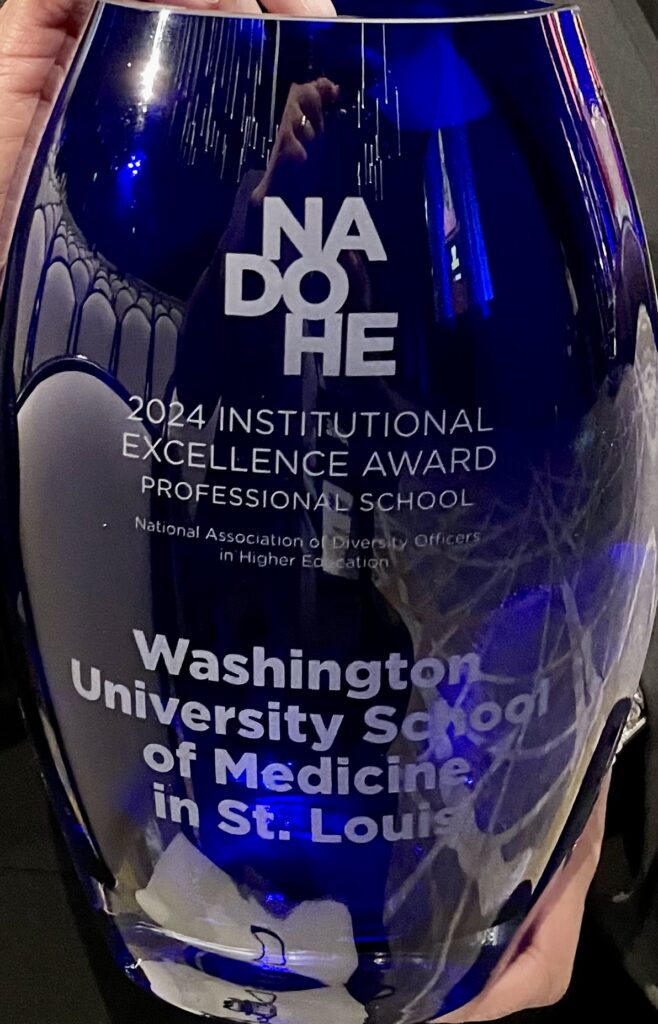Racial and health equity, inclusion threaded through school’s mission

Washington University School of Medicine in St. Louis has received the 2024 National Association of Diversity Officers in Higher Education Institutional Excellence Award for professional schools. The honor recognizes campuswide work by faculty, staff and students who help foster a diverse and inclusive culture based on collaboration, innovation and best practices.
The award is given to institutions that have demonstrated measurable progress in promoting and sustaining innovative diversity efforts within the campus community. Such efforts include curricular reform, institutional leadership and transformation, assessment policies and practices, professional development, accountability measures, and outreach efforts.
“Creating and sustaining a climate that is diverse and inclusive takes conscious effort and honest reflection,” said David H. Perlmutter, MD, executive vice chancellor for medical affairs, the George and Carol Bauer Dean of the School of Medicine and the Spencer T. and Ann W. Olin Distinguished Professor. “It is reaffirming to see WashU Medicine recognized for our efforts.”
Sherree A. Wilson, PhD, who joined the Medical Campus in 2018 as the school’s inaugural associate vice chancellor and associate dean of diversity, equity and inclusion for the Office of Diversity, Equity & Inclusion (ODEI), who accepted the award on behalf of the School of Medicine, said the award is “recognition of WashU Medicine’s schoolwide commitment to diversity, equity and inclusion.
“Our success in large part is due to DEI being embedded as a shared institutional responsibility,” Wilson said. “We’ve intentionally threaded these critical values throughout the school’s mission to support an environment that fosters creative research, health care and education to accomplish the goal of ensuring every person on the Medical Campus feels included, and respected.”
Among steps taken at the medical school:
- Co-founded the Collegiate School of Medicine and Bioscience in 2013 as a magnet high school within St. Louis Public Schools. In August 2023, the school was ranked the No. 2 public high school out of 455 schools in Missouri.
- An Academic Pathways Program (APP) unit has been established. APP provides students and potential applicants with exposure and access to opportunities in healthcare and biomedical research. APP places a particular emphasis on partnerships and outreach in the greater metropolitan St. Louis region.
- Among first-year medical students, 30% of the entering class of 2023 are from populations underrepresented in medicine, double the percentage of such students who entered medical school in 2017. Further, the medical school’s Gateway Curriculum, launched in 2020, integrates a health equity and justice thread, with an emphasis on social and structural determinants of health, and community outreach.
- Since 2017, the School of Medicine has increased the number of faculty from populations historically underrepresented in medicine and research by 82%, from 118 to 215. Also in that time, women faculty have increased by 46%, from 819 to 1,199.
- An increase in diversity among senior leaders serving on the Executive Faculty, the medical school’s primary decision- and policy-makers. In 2017, three of the 26 Executive Faculty leaders were women, and none came from populations underrepresented in medicine. In 2023, the group included seven women and three people from underrepresented populations.
- ODEI offers and facilitates DEI education and professional development on a broad range of topics, including advancing disability inclusion; inclusive search practices; communications across cultures; equity in mentoring, cultivating inclusive lab environment sand how to be an upstander.
- In 2021, a “Commitment to Anti-Racism” statement was issued articulating the school’s intent to address any systemic disparities across its missions of education, research and patient care. Also, a comprehensive professional development Understanding Systemic Racism curriculum for faculty, staff and trainees were developed and implemented.
- OUTMed, a schoolwide organization, advocates for the LGBTQIA+ community, coordinates a mentoring program for faculty, staff and trainees; and sponsors programming throughout the year.
- The Program in Physical Therapy has developed comprehensive initiatives aimed at increasing diversity in the profession; in 2022, the program received the American Physical Therapy Association’s Minority Initiative Award in recognition of those efforts.